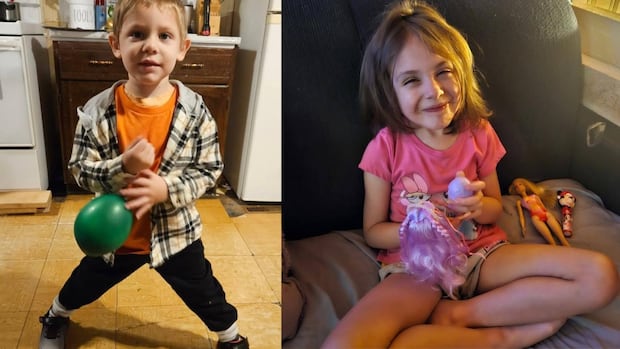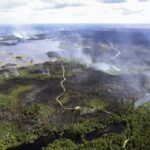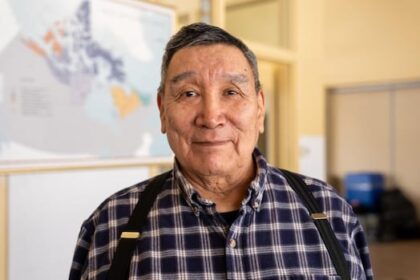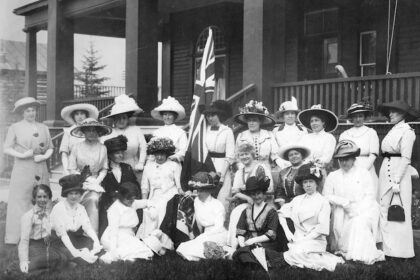Nova Scotia·UpdatedNova Scotia RCMP said Friday they are planning to use cadaver dogs to search for Lilly and Jack Sullivan, last seen at their home in Lansdowne Station on May 2. Dogs are trained to pick up scent of human remainsAly Thomson · CBC News · Posted: Sep 19, 2025 11:42 AM EDT | Last Updated: 5 minutes agoCadaver dogs to be deployed in search for missing N.S. kids Lilly and Jack Sullivan were reported missing from their home in Pictou County on May 2, 2025. Andrew Sampson has the story.Cadaver dogs will soon scour for two children who disappeared from rural Nova Scotia more than four months ago, but RCMP maintain they do not have reason to believe Lilly and Jack Sullivan are dead.Lilly, 6, and Jack, 4, were reported missing on May 2, when police received a 911 call from their mother saying they had wandered away from their home in Lansdowne Station, a sparsely populated community in Pictou County about 140 kilometres northeast of Halifax.Their disappearance sparked an extensive grid search that spanned 8.5 square kilometres of mostly dense woods and involved about 160 ground search and rescue volunteers, service dogs, drones and helicopters.But cadaver dogs, trained to pick up the scent of human remains, were not deployed during that search.On Friday, police said there are “searches planned,” but would not say where and when, citing safety concerns. They did confirm the searches will not happen this weekend. Search and rescue crews and other responders are seen on May 5, 2025, during the ongoing search for Lilly and Jack Sullivan in Nova Scotia’s Pictou County. (Truro & Colchester Code 1 Coverage/Facebook)During a media availability Friday, Cpl. Guillaume Tremblay said police have taken a number of investigative avenues, including the ground searches, following up on more than 800 tips and reviewing more than 8,000 videos.Deploying cadaver dogs is a next step in the investigation, he said.”What’s important to remember is that at this time, we don’t have any definitive information to support that the children are deceased. But we have to keep our minds open and look at all investigative avenues,” said Tremblay.”This is another example of utilizing all services that are available to our officers and we have to remain patient. I know the public, our officers, want to know what happened and we’re not going to stop until we find out what happened.”Belynda Gray is the paternal grandmother of Lilly and Jack Sullivan. (Angela MacIvor/CBC)The children’s paternal grandmother, Belynda Gray, said she wanted to “jump up and down” upon hearing the news Friday. Gray has long called for cadaver dogs to be brought in.Nevertheless, she feels the investigation is not progressing quickly enough and she’s troubled by the lack of information being provided by police.”They’re finally doing something that to me should have been done a couple of months ago at least,” said Gray, whose son Cody Sullivan is Jack and Lilly’s biological father, although he has not been in their lives for three years.”It’s really been a roller-coaster. You get through your days and you just do the best you can.”Tremblay said police dogs that were deployed during previous searches are trained to pick up the scent of a living person or someone who had recently died.Staff Sgt. Stephen Pike, program manager of the RCMP Police Dog Services Training Centre in Innisfail, Alta., said human remains detection dogs are highly specialized and highly trained to detect the distinct odour of decomposition.None of the roughly six to eight dogs that are in service in Canada are based in Nova Scotia, he said. There is one dog team on P.E.I., but they are not currently operational due to a medical leave.Sgt. Dave Whalen and his dog Kitt will join Insp. Luke Rettie and his dog Narc to conduct the searches over the coming days and weeks, RCMP said. Both are based in British Columbia.The two children went missing from this home on Gairloch Road in Lansdowne Station, about 20 kilometres southwest of New Glasgow, on May 2, 2025. (Josh Hoffman/CBC)Speaking generally, Pike said cadaver dogs are usually brought in when there is reason to believe decomposition has taken place and other possibilities — such as the person wandered off — have been ruled out.He said the success of the dogs depends completely on whether the odour is present and being released. If the remains are somewhere airtight, the odour may not be detectable.There is no definitive timeline on how long the scent can remain detectable, as it depends on the size of the person and environmental factors, said Pike. But he noted a case in which a dog uncovered material related to an investigation two years later from the ocean floor at low tide.They’re also able to detect scents underwater and underground. Even in challenging environments like septic fields or landfills, the dogs can be effective because human decomposition is unique.”They don’t rely on the visual. They will take us to that foliage. They will take us to those somewhat concealed or buried or whatnot [areas]. If there’s odour present, the dogs will locate it,” said Pike, who has been a dog handler for 25 years.WATCH | RCMP scrutiny of missing children’s mother, stepfather suggests no criminal involvement:Court documents shed new light on case of missing N.S. childrenSix-year-old Lilly Sullivan and her four-year-old brother Jack disappeared from their home in Lansdowne Station, N.S., on May 2. Angela MacIvor has the story.In late August, CBC asked the RCMP if cadaver dogs would be deployed. A spokesperson said any searches for human remains “will be based on information gathered through the ongoing investigation.””Officers are continuing to assess information and forensic evidence, including that collected from the large search area,” Cindy Bayers said in an email statement on Aug. 25.Those items included a pink blanket that was seized on Lansdowne Road early in the search.Court documents released in late August revealed that as of July 16, investigators did not believe the case was criminal in nature.ABOUT THE AUTHORAly Thomson is an award-winning journalist based in Halifax who loves helping the people of her home province tell their stories. She is particularly interested in issues surrounding women’s health, justice, education and the entertainment industry. You can email her with tips and feedback at aly.thomson@cbc.ca.
RCMP say cadaver dogs will be deployed to search for missing N.S. children











